Padraic McGrath stepped forward at a Mass May 12 at St. Francis of Assisi Church in Oakville, asking to be allowed to profess the Rule of the Secular Franciscan Order and to make a permanent commitment to the Gospel of Life.
His profession in the Secular Franciscan Order was witnessed by other members of the St. Francis of Assisi Fraternity and some of his family and friends. Christine Blood, the fraternity’s minister, received him into the fraternity as “a cause of great joy and hope for the members of this community” and Franciscan Father Ralph Parthie confirmed the commitment in the name of the Church. Padraic was then presented with the New Testament, San Damiano Cross and a lighted candle.
Padraic explained that his time of formation has strengthened him in the conviction that the Lord is calling him to observe the Gospel following Jesus in the footsteps of St. Francis.
Padraic, 38, is one of 40 Secular Franciscans in the St. Francis of Assisi Fraternity, which is one of three Secular Franciscan fraternities in the archdiocese. Secular Franciscans live out their calling to the Franciscan life in their homes and families, at work, in their parishes and in the world.
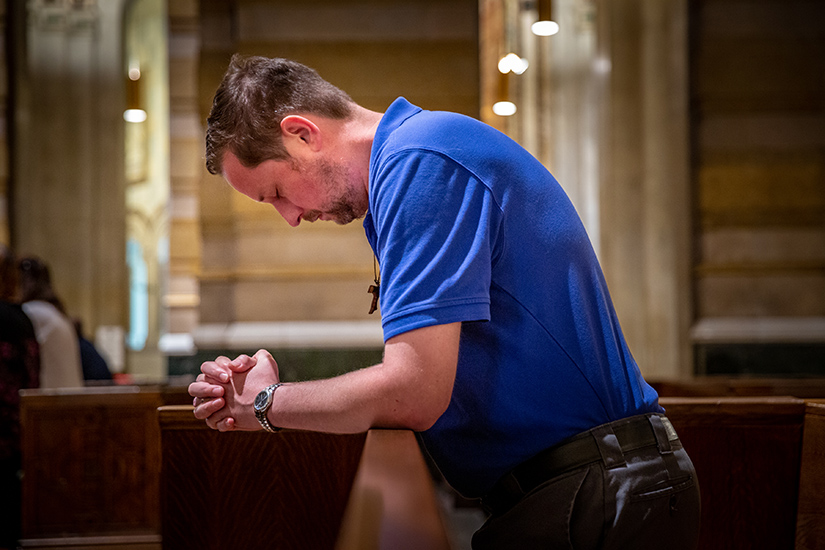 Padriac McGrath prayed during Mass at the Cathedral Basilica of Saint Louis in June. Padraic made his profession with the Secular Franciscan Order in May.Photo Credit: Lisa Johnston
Padriac McGrath prayed during Mass at the Cathedral Basilica of Saint Louis in June. Padraic made his profession with the Secular Franciscan Order in May.Photo Credit: Lisa JohnstonSpiritual gifts
Secular third orders of religious communities such as the Franciscans, Benedictines, Servites, Discalced Carmelites and Dominicans are designed for people who are not called to live in community but are still attracted to the charism of the religious community. They fulfill the rule of the order and its charisms as they continue in their vocation in marriage, parenthood or the single life.
The Catholic Church is full of other options for people who want to live out different charisms or spiritual gifts.
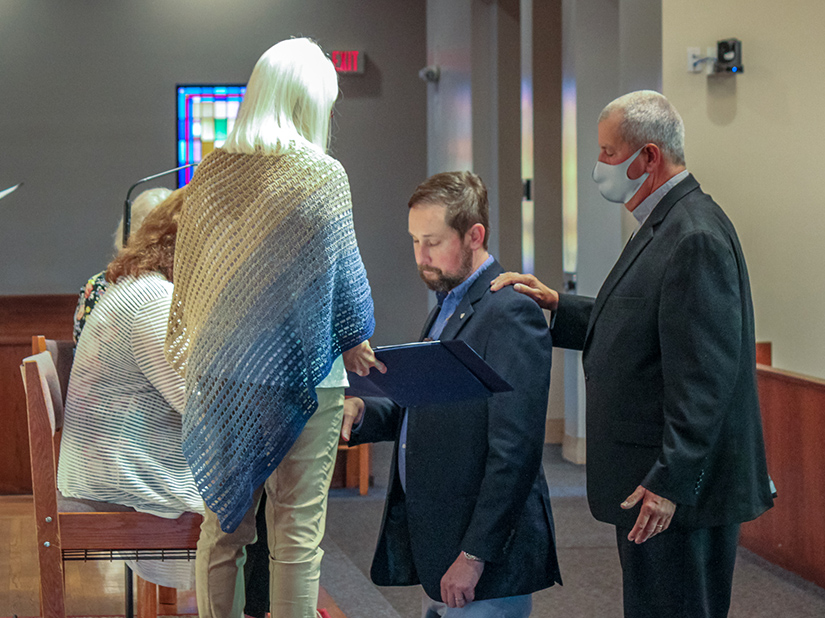 Padriac McGrath made his profession with the Secular Franciscan Order at St. Francis of Assisi Church in May.Photo Credit: Joseph Kenny
Padriac McGrath made his profession with the Secular Franciscan Order at St. Francis of Assisi Church in May.Photo Credit: Joseph KennyThe Rule of Life that Padraic professed is based on the one that St. Francis of Assisi wrote in 1221, having been updated and approved by Pope St. Paul VI in 1978 but still true to the vision of St. Francis for the “Order of Penitents.”
Padraic has always had an affinity toward St. Francis. He’s been doing spiritual direction with a Franciscan Sister of Our Lady of Perpetual Help, a big influence on him. When John F. Kennedy High School closed, he checked out books they were giving away, and one on the Secular Franciscans grabbed his attention.
He looked up the fraternity at St. Francis, exchanged emails, attended a meeting to observe and then began formation, a period of listening, reading, discussion and prayer. It is a period of personal transformation, assisted by experience in fraternity and through the inspiration of the Holy Spirit. Padraic answered questions in each chapter of formation and met with his formation director about his answers, attended fraternity meetings and participated in ongoing formation with other members.
Prayer, living the Franciscan charism, treating everyone as a child of God, viewing all creation as a gift from God and being part of the fraternity are a part of what people can gain from the Secular Franciscans, Padraic said.
He tries to bring the charism to all aspects of his life, especially with his children, showing them appreciation for creation and showing them that all people are loved equally and have dignity.
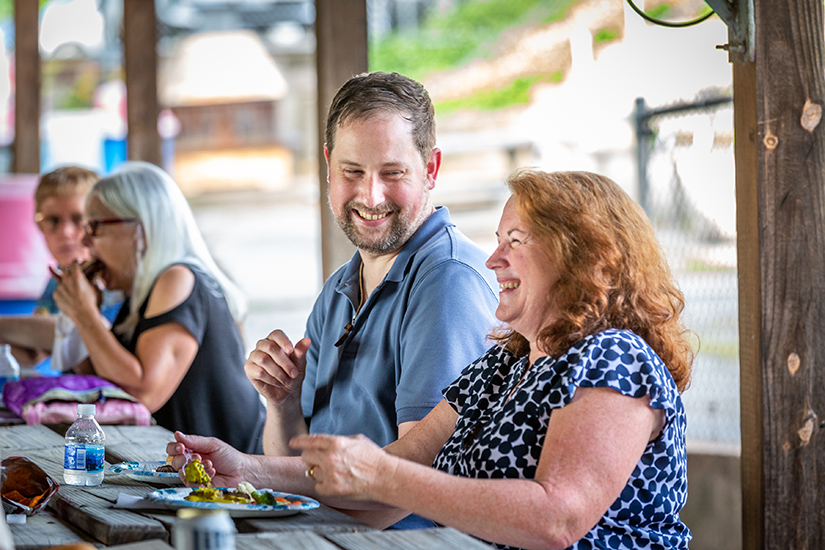 Padraic McGrath laughed with Christine Blood and his fellow Secular Franciscans at their monthly meeting at Immaculate Conception Parish picnic area in Arnold in June.Photo Credit: Lisa Johnston
Padraic McGrath laughed with Christine Blood and his fellow Secular Franciscans at their monthly meeting at Immaculate Conception Parish picnic area in Arnold in June.Photo Credit: Lisa JohnstonThe Secular Franciscan Order, known as the Third Order of St. Francis, was established by St. Francis of Assisi 800 years ago. St. Francis is the only founder of a religious order who also founded a third order as an expression of his tradition as a spiritual path for lay men and women. Padraic is one of 400,000 professed single or married lay men or women and some diocesan clergy in the Secular Franciscans (10,000 U.S. members). They strive for perfect charity and gather on a regular basis for prayer, ongoing formation, ministry, fellowship, retreats and actions.
Padraic is younger than many of the people in the Secular Franciscan fraternity, but he gains much from their life experiences. “They’ve been doing this a lot longer than I have, and I can learn from that as well,” he said. Padraic’s interest in the Secular Franciscans is mirrored by a few other people in their 30s and 40s who recently inquired about the third order, said Blood, the fraternity’s minister.
Padraic has a master’s degree in public policy and administration from the University of Missouri-St. Louis and works in the quality improvements section supporting planning efforts at Catholic Charities of St. Louis. He lives in Webster Groves with his wife, Sarah, and four children ranging in age from 10 to 2. They attend Little Flower Parish in Richmond Heights. He volunteers with the City of Webster Groves sustainability commission.
Deacon Steve Schisler of Immaculate Conception Parish in Arnold was Padraic’s sponsor for his profession. “To see a guy like Padraic going through with it with his wife and children supporting him really gives me hope for the Church,” Deacon Schisler said. “Especially when I see so many young people falling away and people with families spending less and less time and energy on the faith training on their children, to have Padraic involved is a real shot in the arm.”
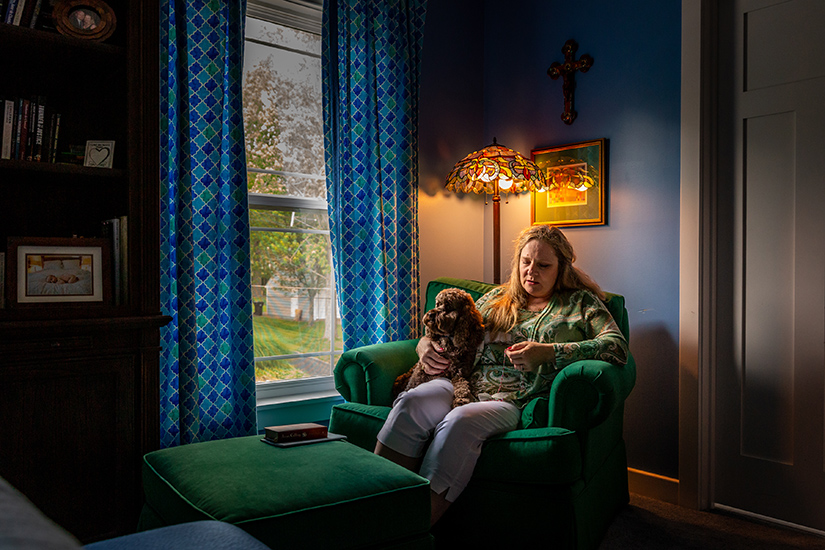 Katey Darpel, a member of the Daughters of St Francis de Sales, prayed the Rosary while her dog, Hershey, sat with her in her “prayer chair” at her home in Kirkwood in JunePhoto Credit: Lisa Johnston
Katey Darpel, a member of the Daughters of St Francis de Sales, prayed the Rosary while her dog, Hershey, sat with her in her “prayer chair” at her home in Kirkwood in JunePhoto Credit: Lisa JohnstonLife-changing
Taking part in the formation program of the St. Francis de Sales Association was life-changing for Katey Darpel. She now is a regional directress in the association, one of two branches of the Society of the Daughters of Saint Francis de Sales. The other branch is the Salesian Missionaries of Mary Immaculate, a community of women religious whose aim is to promote evangelization among women and the poor by catechism, education and health care. The lay association is unique because it was founded before the religious order it is associated with. Founded in 1872 by Father Henri Chaumont and Caroline Carré de Malberg in France, the association’s roots are grounded in the teachings of St. Francis de Sales.
The St. Francis de Sales Association is only for women, but it is associated with the Sons of St. Francis de Sales for men. Both are considered spiritual families for Catholic lay men and women who desire to live a devout life. Salesian spirituality, based on love and the Gospel message, offers a simple way of reconciling the often conflicting demands of home, family, career, Church and community.
Katey’s mother was a member of the association, informally known as Daughters. Her mom made her consecration 52 years ago when she was pregnant with Katey. And her father did formation with the Sons of St. Francis de Sales when he retired at age 51. His consecration day was the last time Katey saw him before he died. “As he went through formation and did readings, when I would come home and visit Mom and Dad, he would say, ‘Katey, you have to read this, listen to how wise he is.’”
A few months after her dad died, Katey’s mom invited her to consider the association — a move that grounded her at a hard time in her life and brought a connection with her dad’s life. A companion was assigned to walk her through formation. The aspiranship is a time of discerning God’s will with a six-month study of St. Francis de Sales’ spirituality and the virtues he espoused. A two-year formation process ensues for those who want to continue. It concludes with an act of consecration at a Mass. Members receive a medal and promise to live according to the Gospel and the teachings of St. Francis de Sales.
Spiritual friendship
 Katey Darpel sat on her front porch with James, 8, and Joseph, 9, at her home in Kirkwood. Katey said of the Daughters of St. Francis de Sales, “A lot of time they are people who go to daily Mass who are looking for a deeper relationship with God, a yearning for something more.”Photo Credit: Lisa Johnston
Katey Darpel sat on her front porch with James, 8, and Joseph, 9, at her home in Kirkwood. Katey said of the Daughters of St. Francis de Sales, “A lot of time they are people who go to daily Mass who are looking for a deeper relationship with God, a yearning for something more.”Photo Credit: Lisa JohnstonIn formation, every other month involves a study of a virtue with the following month devoted to implementing that virtue. Consecrated members do three virtues (known as probations) a year. During the COVID-19 outbreak, members focused on patience.
Spiritual friendship is a big theme, too. “That’s what holds us all together, that we’re all supporting one another on this journey of trying to grow in virtue and stay close to Jesus throughout our lives,” Katey said.
A parishioner of St. Gerard Majella, Katey has a master’s degree in journalism from the University of Missouri-Columbia and founded Katey Charles Communications in 2003. She is married with two sons, ages 8 and 9. She’s a board member of Our Little Haven.
She has friends from the association from 30 to 95 years old. “You really grow from the wisdom of others trying to live this spirituality their whole lives,” she said.
People tend to get interested in the association in their 40s and 50s, but some younger people are becoming more interested. “A lot of time they are people who go to daily Mass who are looking for a deeper relationship with God, a yearning for something more,” Katey said. “It is a fun social thing, but the primary purpose is to deepen your spiritual life. It’s important that you feel a call to it.”
It’s helped her develop a prayer life and be comfortable talking about prayer and her faith with her friends. The study of virtues of gentleness and humility particularly affected her. St. Francis de Sales wrote that first people have to be gentle with themselves before being gentle with others, and Katey spent a lot of time working on that. She considers herself a sensitive person, so the study of humility helped her get beyond thinking just of herself so often and become outwardly focused. “It definitely challenged me to retool my own thinking. It made me calmer, less apt to react to others defensively and helped me give people the benefit of the doubt and always assume people are coming from a good place.”
The association has about 600 U.S. members in 31 groups. St. Louis has about 80 members. The U.S. groups were founded in this country by Delphine Madill, a parishioner of the Cathedral Basilica of St. Louis.
Consecrated life
The Catechism of the Catholic Church explains that there are various forms of consecrated life:
• Eremetic life — Without always professing the three evangelical counsels publicly, hermits “devote their life to the praise of God and salvation of the world through a stricter separation from the world, the silence of solitude and assiduous prayer and penance.”
• Religious life — Born in the East during the first centuries of Christianity, it is lived within institutes canonically erected by the Church. It is distinguished from other forms of consecrated life by its liturgical character, public profession of the evangelical counsels, fraternal life led in common, and witness given to the union of Christ with the Church.
• Consecrated virgins and widows — From apostolic times, Christian virgins and widows, called by the Lord to cling only to Him with greater freedom of heart, body and spirit, have decided with the Church’s approval to live in the respective states of virginity or perpetual chastity “for the sake of the kingdom of heaven.”
• Secular Institutes — “A secular institute is an institute of consecrated life in which the Christian faithful living in the world strive for the perfection of charity and work for the sanctification of the world especially from within.” By a “life perfectly and entirely consecrated to (such) sanctification,” the members of these institutes share in the Church’s task of evangelization, “in the world and from within the world,” where their presence acts as “leaven in the world.”
• Societies of Apostolic Life — Alongside the different forms of consecrated life are “societies of apostolic life whose members without religious vows pursue the particular apostolic purpose of their society, and lead a life as brothers or sisters in common according to a particular manner of life, strive for the perfection of charity through the observance of the constitutions. Among these there are societies in which the members embrace the evangelical counsels” according to their constitutions.
– Catechism of the Catholic Church, 915-930
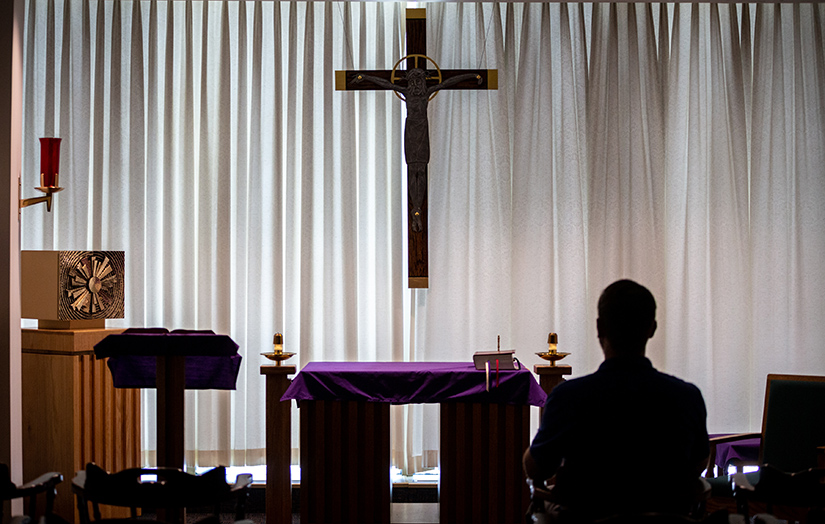 Padraic McGrath prayed in the chapel at Catholic Charities of St. Louis in June.Photo Credit: Lisa Johnston
Padraic McGrath prayed in the chapel at Catholic Charities of St. Louis in June.Photo Credit: Lisa Johnston
A calling for laypeople
Various lay apostolates, movements, third orders, secular institutes and associations cooperate in the universal mission of the Church.
Examples include the Secular Servites at Seven Holy Founders Parish in Affton. Inspired by Mary, its spirituality is informed by a variety of service and by praternal communion in witnessing the Gospel.
The Secular Servites state that the role of laypeople is to “seek God and minister God’s love. The laity have the opportunities to evangelize and bring about the kingdom of God. Lay spirituality is founded on the struggle to live the Gospel of Jesus in the ‘thick’ of life. It is in the world where God calls lay persons to minister and to encounter the loving presence of God.”
Another example is the Rural Parish Workers of Christ the King, who have a ministry to people who are poor. They are vowed Catholic women in rural Missouri who live the Rule of St. Benedict: Christ-centered spirituality; hospitality and service; adherence to the Gospel mandate of Christ; and welcoming, serving and witnessing to their neighbors.
The Secular Carmelites, Benedictine Oblates and Lay Dominicans are among the third orders with a presence in the archdiocese. Opus Dei is a personal prelature.
The associate movement in North America has shown much growth in recent years. It is helping to keep alive the charism of religious orders as the number of vowed religious decline. About 22 such lay associations are active in the Archdiocese of St. Louis.
For information, contact the archdiocese’s Office of Consecrated Life at (314) 792-7252 or [email protected].
Formation
The various secular orders have formation processes that are unique, but overall they consist of monthly meetings, study on living the charism in the world and guidance from others who have gone through the process. The Secular Franciscans, for example, have a period of initiation that includes orientation and inquiry where a person begins to discern his or her call to the order and acquires a preliminary understanding of the vocation and the Franciscan charism.
The period of initial formation also is called candidacy, continuing for aout 18 months, with further learning, participation and collaboration in fraternity life.
The St. Francis de Sales Association formation is similar. Formation is the process one goes through to become a “consecrated” associate, one who commits to live according to the “probations” or teachings of the association and the Rule of Life. It is a two-year program of “probations” that their companion guides them through. It provides a foundation of the teachings and beliefs of St. Francis de Sales to which all of the associates aspire.